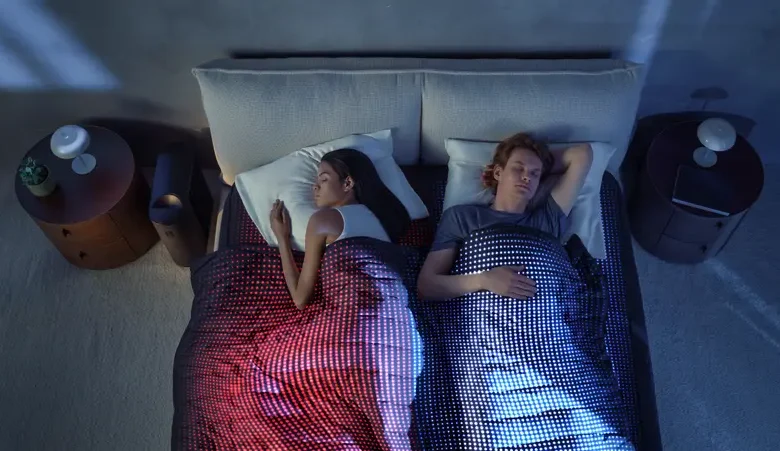From Riyadh to Dubai: Can technology help the Gulf sleep better?

In Saudi Arabia and the United Arab Emirates, where late nights and extreme heat often disrupt rest, sleep is emerging as a new wellness priority and is recognized as essential for health and productivity.
Sleepless in the Gulf
Research paints a clear picture: the Gulf is struggling to get enough rest.
Nearly one in three Saudis sleeps fewer than seven hours a night, according to research in Nature and Science of Sleep, while more than 65 percent of Saudi teens experience disrupted sleep and one-third report daytime fatigue.
Another study found that 8.8 percent of Saudi adults live with obstructive sleep apnea, a disorder that increases the risk of cardiovascular disease.

Meanwhile in the UAE, studies show many adults average fewer than seven hours of sleep.
For Emirati university students, one study showed that 57 percent have irregular bedtimes and poor sleep quality, underscoring how sleep deficits cut across age groups.
Consequences of lack of sleep
Sleep is so much more than just the number of hours you spend in bed, according to Family Medicine Consultant and pioneer in Integrative and Longevity Medicine Dr. Cherine Bazzane.
“When it comes to sleep, many people have a simple mindset: ‘As long as I get my seven to nine hours, I’m good.’ But sleep is so much more than just the number of hours you spend in bed; it’s about what happens during that time,” she said.
Sleep operates in cycles, with lighter stages that support learning and deeper stages, including rapid eye movement (REM), that are essential for emotional regulation and memory consolidation, she explained.
“If you cut back on those hours, you simply don’t give your body enough time to carry out these crucial tasks,” she said.
Chronic lack of sleep has been linked in numerous studies to faster cognitive decline and a higher risk of Alzheimer’s disease.

Research also shows strong associations between insufficient rest and rising rates of diabetes, obesity, and mental health disorders – all of which are conditions that are already a growing concern in the Gulf.
It is even worse if your sleep is fragmented.
“Even if you think you’ve clocked eight hours, you’re missing out on the depth of sleep that allows your body to clear out damaged cells, stabilize glucose levels, and reset your nervous system.”
Heat, habits, and the hunt for rest
So, why is the problem so severe in the Gulf? The reasons are both environmental and cultural, according to Dr. Bazzane.
“The situation is quite critical here due to a combination of factors that create a perfect storm for poor sleep,” she said.
Culturally, social life tends to extend late into the evening in the region. In Saudi Arabia, business meetings, family gatherings, and even shopping often happen after sundown until well past midnight.
“We live with a late-night social rhythm – dinners often stretch into the 9 to 10 p.m. range, family gatherings run late, and screens keep us engaged well past midnight – all while we have to wake up early for work,” the doctor noted.
As a result, people in the region may report shorter, more fragmented sleep, all of which are made worse by constant device use and irregular schedules, she added.
“Irregular bedtimes, late-night screen time, and social stimulation also elevate our sympathetic nervous system activity, leading to increased cortisol levels – hormones that promote wakefulness and conflict with the natural processes of melatonin and deep sleep.”
The result? “Delayed sleep onset, lighter sleep, and feelings of fatigue the next day, even if we’ve spent enough time in bed,” Dr. Bazzane said.
Moreover, hot weather also plays a crucial role in the sleep quality people in the region get.
The human body naturally prepares for sleep by cooling down, usually dropping our core temperature by about one to three degrees Celsius, the doctor explained.
When evenings remain warm, that cooling process is hindered, which delays sleep onset and leads to more frequent awakenings.
“In our region, the long, hot nights keep many people indoors under bright artificial lights, which further delays melatonin production. The combination of dry, conditioned air and occasional nighttime noise contributes to lighter, more fragmented sleep,” she said.
Taking on Saudi Arabia and the UAE
To address the region’s sleep deficit, new technology has emerged, offering tools that promise to improve both quality of rest and long-term wellbeing.
Analysts project the global sleep tech industry could reach $89 billion by 2030, with the GCC ranking among the fastest-growing wellness markets.
Given these challenges, companies are moving into the region.

One of these companies is Eight Sleep, a US-based company that builds AI-powered sleep technology, promising to make better sleep a reality in the UAE and Saudi Arabia.
Its flagship product, the Pod 5, which Co-Founder and CEO Matteo Franceschetti calls “the world’s first AI-powered sleep system,” uses real-time biometric data to automatically adjust temperature, elevation, and sound throughout the night.
These features are typically needed to counter the heat and lifestyle challenges that make quality sleep difficult in the Gulf.
“Both Saudi and the UAE rank among the countries where members set their Pods to the coldest temperatures, with users in both countries logging roughly seven hours of sleep, placing them in the bottom 25 percent of all Eight Sleep markets,” Franceschetti told Al Arabiya English in an interview.
“It’s clear managing heat at night is critical in this market.”
The Pod also includes a health monitoring function that Eight Sleep says can track cardiovascular and respiratory health during sleep. According to Franceschetti, the system is designed to flag subtle shifts in heart rate, breathing, or variability before symptoms appear.
He added that more than 100 devices were already in use in the Kingdom ahead of the launch in May, and the company expects the GCC, led by Saudi Arabia and the UAE, to become its second-largest market after the United States.
Smart pillows
Eight Sleep has also unveiled products beyond beds. Earlier this month, the company introduced the Pod Pillow Cover, a device designed to cool standard pillows by circulating water through built-in channels to maintain set temperatures.
The company says an internal study suggests the technology can reduce the time it takes to fall asleep by up to 20 percent.
According to Franceschetti, the product could be seen as a piece of a larger vision.

“Our goal is to reinvent sleep by addressing every variable that disrupts it: from temperature to elevation, sound, and beyond.
With each innovation, we’re building the first-ever operating system for sleep, powered by AI and personalized data,” he told Al Arabiya English.
Sleep and the Gulf’s vision for better health
Better sleep has been linked to sharper focus, higher productivity, and improved resilience – all of which are qualities essential in high-performing economies like those of the GCC.
What makes sleep tech especially timely in the Gulf is its alignment with national priorities.
Saudi Arabia’s Vision 2030 places health, wellness, and preventive care at the center of its reform agenda.
Meanwhile, the UAE’s National Program for Happiness and Wellbeing also underscores the importance of sleep in boosting mental health and longevity.
However, the Gulf’s sleep revolution won’t be won overnight.
Technology is a powerful tool, but it should serve as an amplifier of good habits rather than a replacement for them, Dr. Bazzane said.
“Get the foundations right first and then let smart technology help create an environment that allows your biology to thrive,” she said.
“Once you’ve established the fundamentals – like a consistent wake time, exposure to morning light, lighter dinners earlier in the evening, and a screen-free wind-down – temperature-regulating systems can be transformative, especially in hot climates,” she explained.










